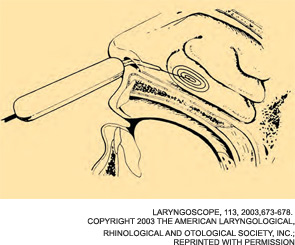What is the feasibility of robotic thyroid surgery in North American patients? Background: Less invasive thyroid surgery approaches, such as video-assisted thyroidectomy, may be technically difficult and still result in a […]
Treatment Success Poor for Age-Related Vocal Fold Atrophy
What is the perceived treatment success for patients with vocal fold atrophy? Background: Estimates for the number of elderly people with voice problems range from 4 percent to 30 percent. There […]
Study Raises Questions about Angioedema Management
What are the criteria for airway intervention in patients with angioedema? Background: Angioedema is painless edema of the mucosal and cutaneous surfaces. The more common type is hereditary and is caused […]
Larygnopharyngeal Reflux Changes Laryngeal Mucosa
How does reflux affect laryngeal tissue quality? Background: Laryngopharyngeal reflux has deleterious effects on the larynx. Due to the poor intrinsic protective mechanisms in this tissue, damage occurs at a higher […]
Nasopharyngeal Trumpet Serves as Direct Conduit in Fiberoptic Intubation
Is there a simple approach to facilitating fiberoptic intubation in the difficult airway? Background: Although fiberoptic intubation is one of the more successful and frequently utilized methods to access the difficult […]
Large Study IDs Risk Factors for Hemorrhage After Tonsillectomy
What are the main risk factors associated with postoperative hemorrhage following tonsillectomy? Background: The most serious risk associated with tonsillectomy is postoperative hemorrhage, with previous reports linking it to operative technique. […]
Nasal Endoscopes May Cause Thermal Injury
What are the temperature variations of nasal endoscopes, and do older scopes reach higher temperatures? Background: Although advances in endoscopic technology have improved illumination and light transmission, there may be […]
Endoscopic Sinus Surgery Improves QoL in Patients with Minimal Disease
Will endoscopic sinus surgery (ESS) provide an improved quality of life (QoL) for patients with medically recalcitrant chronic rhinosinusitis (CRS) who have minimally affected computed tomography (CT) scans of the […]
High-Resolution CT and Diffusion-Weighted MRI Combo Improves Pediatric Cholesteatoma Detection
Does the technique of fusing MRI images with high-resolution CT images improve the efficiency of detecting recurrent cholesteatoma in children, in particular for small cholesteatomas? Background: Radiographic documentation of small recurrent […]

Another Option for Allergic Rhinitis?: Study examines long-term safety, efficacy of RF turbinoplasty
When patients with allergic rhinitis don’t respond to medical therapy, an otolaryngologist’s arsenal of treatment includes surgical options. Among these is radiofrequency (RF) turbinate reduction, also known as RF turbinate ablation or turbinoplasty, an office procedure that advocates say is cost-effective and minimally invasive, with fewer complications than other surgical remedies. Some otolaryngologists, however, are still hesitant to use this relatively new therapy.
- « Previous Page
- 1
- 2
- 3
- 4
- 5
- …
- 8
- Next Page »